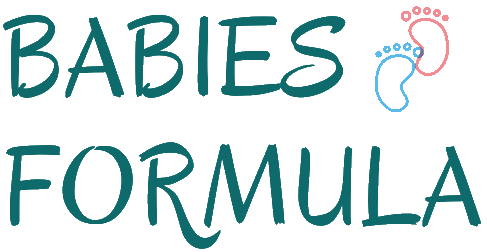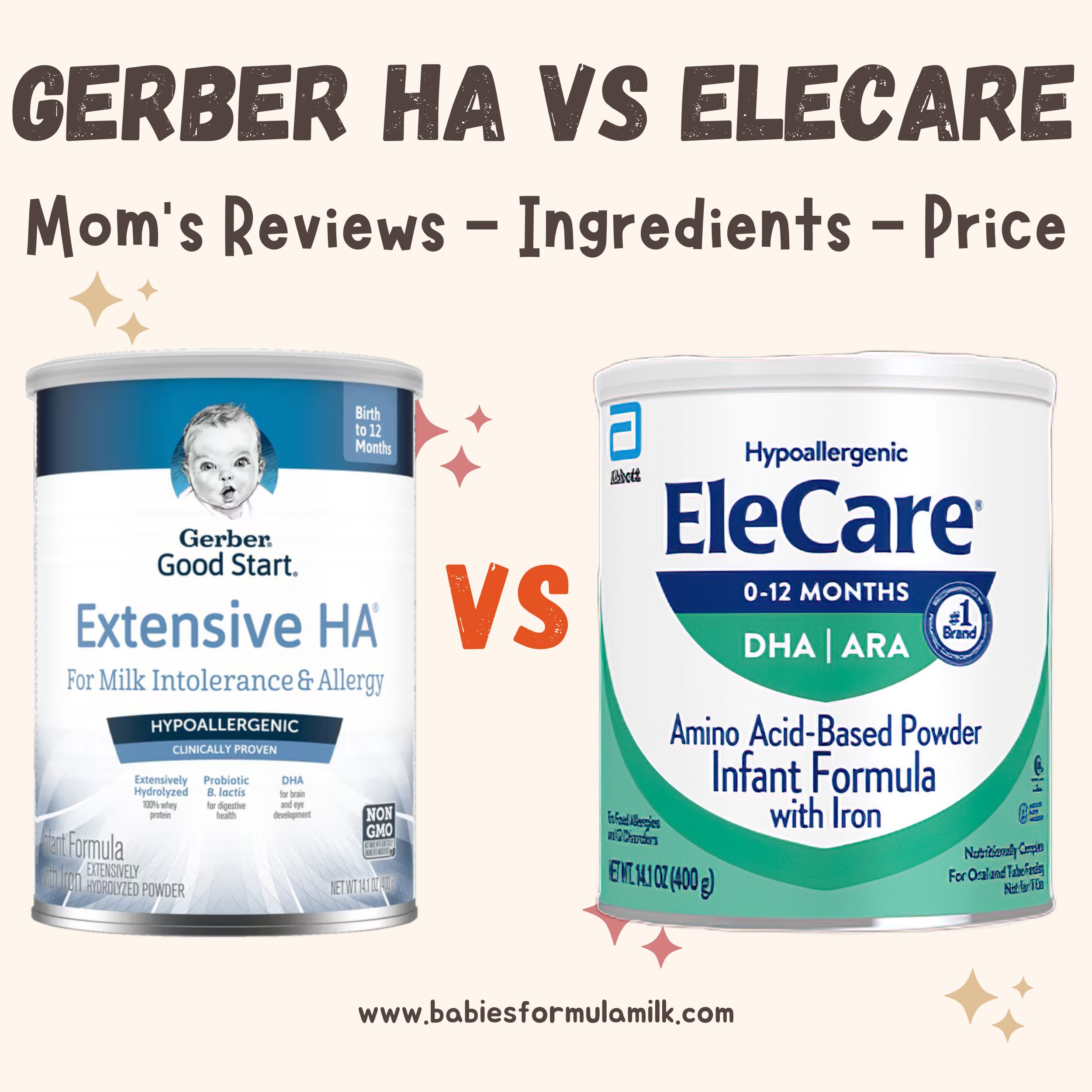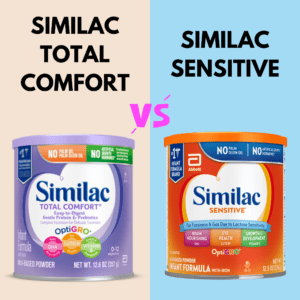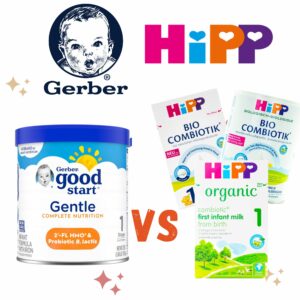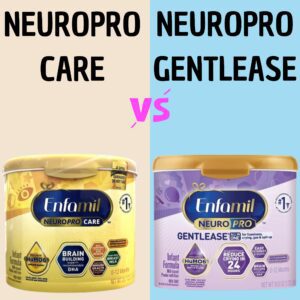Key Differences?
Gerber Extensive HA is a hypoallergenic formula containing partially hydrolyzed whey protein, suitable for mild to moderate allergies. In contrast, EleCare is an amino acid formula, often recommended for severe allergies or sensitivities like CMPA, MSPI, and GERD due to its complete protein breakdown.

The Best One?
The choice between Gerber Extensive HA and Elecare ultimately depends on your baby’s specific dietary needs and sensitivities.
Gerber Extensive HA is a cost-effective option that effectively addresses cow’s milk protein and lactose intolerances. It’s also GMO-free, making it a suitable choice for parents who prefer non-genetically modified ingredients. Furthermore, it helps regulate bowel movements, gas, and diaper rash. If your baby has these specific sensitivities and cost is a significant consideration, Gerber Extensive HA may be a suitable choice.
Elecare, on the other hand, is a more specialized formula designed to cater to a broader range of sensitivities, including CMPA, MSPI, starch allergy, and gluten allergy. It’s particularly effective for babies with reflux, gas, and stomach issues. Additionally, Elecare is enriched with minerals and protein, which can be beneficial for babies with specific nutritional requirements.
“When you buy something using my links, I may earn a small commission at no additional cost to you. This is a kind of support to me. This website doesn’t accept money for reviews. “
Mom’s Reviews Comparison:

Gerber Extensive HA:
Positive Reviews:
- Effective for CMPA: Many mothers found that Gerber Extensive HA worked well in managing Cow’s Milk Protein Allergy (CMPA), providing relief for their babies.
- Gas, Reflux, and Diaper Rash: This formula received praise for its ability to reduce gas, alleviate reflux symptoms, and prevent diaper rash, making it a valuable choice for parents of sensitive infants.
- Regular Bowel Movements: Babies on Gerber Extensive HA tended to have regular and consistent bowel movements, indicating good digestive comfort.
- Pleasant Powder: Moms appreciated that the formula’s powder didn’t have a strong and unpleasant odor like other hypoallergenic formulas, making it easier to prepare.
- Thin Consistency: The thin consistency of the formula was well-received, as it was easy for babies to digest.
- GMO-Free: The fact that Gerber Extensive HA is GMO-Free appealed to parents who preferred formulas with non-genetically modified ingredients.
Negative Reviews:
- Expensive: Some parents found Gerber Extensive HA to be expensive, although it was considered more affordable than Elecare and other hypoallergenic formulas.
- Limited Availability: It could be challenging to find this formula in physical stores.
- Unpleasant Taste: The taste of Gerber Extensive HA was not always well-received by babies and parents, potentially leading to feeding difficulties.
- Potential Side Effects: A few babies experienced constipation and reflux while on this formula, which raised concerns among some parents.
- Small Can Size: The limited quantity in each can be a drawback for many parents, as it necessitates frequent purchases.
Elecare:
Positive Reviews:
- Effective for CMPA, MSPI, and Lactose Intolerance: Elecare garnered positive feedback for its efficacy in managing various sensitivities, including Cow’s Milk Protein Allergy (CMPA), Milk Soy Protein Intolerance (MSPI), and lactose intolerance.
- Gas, Reflux, and Stomach Issues: Mothers praised Elecare for its ability to reduce gas, alleviate reflux, and address various stomach issues, providing relief to their infants.
- Ease of Preparation and Digestion: Many moms found Elecare easy to mix and noted that it was gentle on their babies’ digestive systems.
Negative Reviews:
- Expensive: Elecare was considered very costly, which may be a limiting factor for some families.
- Taste and Smell: Some babies and parents found Elecare’s taste and smell to be unpleasant, potentially impacting the feeding experience.
- Not Branded as GMO-Free: Unlike Gerber Extensive HA, Elecare does not carry a GMO-Free label.
- Hard Stools: A few babies experienced hard stools while on Elecare, which could be uncomfortable for infants.
- Limited Availability: Just like Gerber Extensive HA, Elecare could be challenging to find in physical stores, requiring planning for procurement.
Related: Gerber Extensive HA VS Neocate: What’s The Difference?
Ingredients Comparison:
Protein Source:
Gerber Extensive HA uses extensively hydrolyzed whey protein as its protein source. This means that the whey protein has undergone a process of extensive breakdown, making it easier for babies with allergies or sensitivities to digest.
Elecare, on the other hand, utilizes free amino acids as its protein source. Free amino acids are the building blocks of proteins and are the most broken-down form of protein, making it highly suitable for infants with severe allergies or sensitivities, as it leaves virtually no room for allergic reactions.
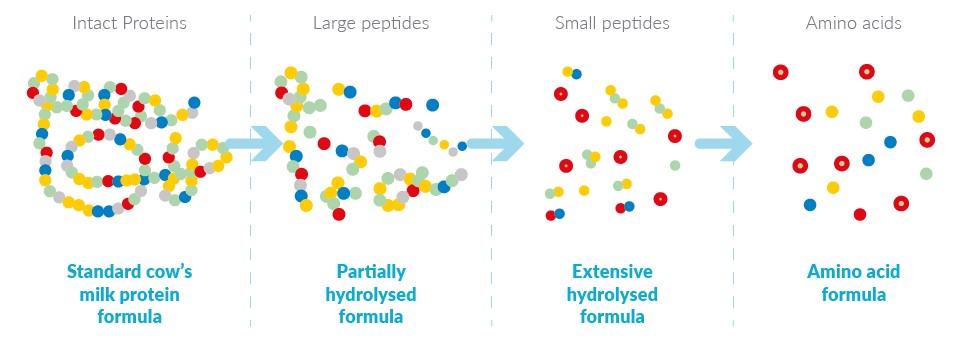
Carbohydrate Source:
Gerber Extensive HA contains a carbohydrate blend consisting of 90% corn maltodextrin and 10% potato starch. These carbohydrates are often used in infant formulas to provide energy and promote healthy growth.
Corn maltodextrin is a common carbohydrate source in infant formulas. It is derived from corn and provides a readily available source of energy for growing infants. Potato starch, on the other hand, is a less common but still digestible carbohydrate that can contribute to the overall carbohydrate content of the formula.
Elecare, on the other hand, uses corn syrup solids as its carbohydrate source. Corn syrup solids are a common carbohydrate source in many infant formulas, providing a source of easily digestible energy.
Related: Puramino VS Gerber Extensive HA: What’s The Difference?
Fat Source:
Gerber Extensive HA contains a diverse blend of fats, including 46% medium-chain triglycerides (MCT), 28% soy oil, 10% high oleic sunflower oil, 6% high 2-palmitic vegetable oil, and 5% CITREM (an emulsifier). This varied fat composition is designed to provide essential fatty acids and energy for infants while aiming to reduce the risk of allergic reactions.
Elecare, on the other hand, includes a simpler fat composition consisting of 33% medium-chain triglycerides (MCT), soy oil, and high oleic safflower oil. MCTs are known for their easy digestibility and quick absorption, which can be beneficial for infants with digestive sensitivities.
In summary, Gerber Extensive HA contains a more complex blend of fats, including MCTs, various vegetable oils, and an emulsifier, while Elecare offers a simplified fat composition, primarily featuring MCTs, soy oil, and high oleic safflower oil.
Prebiotics/Probiotics:
Gerber Extensive HA includes the probiotic B. Lactis, which can contribute to a healthy gut microbiome. However, it does not contain a prebiotic, which is a type of fiber that nourishes beneficial gut bacteria.
Elecare, unlike Gerber Extensive HA, does not include either a prebiotic or a probiotic in its formulation. It focuses on providing a hypoallergenic and easily digestible formula without additional components that may affect sensitive digestive systems.
Related: Nutramigen Vs EleCare: Full Comparison (With Charts)
Nutrients Comparison:

Micronutrients:
Gerber Extensive HA contains more carbohydrates and fats compared to Elecare due to its carbohydrate blend and diverse fat sources. This means that it may provide a higher calorie content from these macronutrients.
Elecare, in contrast, has a higher protein content compared to Gerber Extensive HA. This difference in macronutrient composition may result in Elecare having a different ratio of micronutrients to better support the specific dietary needs of infants who require higher protein intake.
Related: Alfamino VS Gerber Extensive HA: What’s The Difference?
Vitamins:
Gerber Extensive HA: This formula boasts higher levels of Vitamin A, an essential nutrient for vision and immune system support. It also contains elevated amounts of Vitamin C, which plays a vital role in immune health, and Vitamin B2 (Riboflavin), important for energy production. Additionally, Gerber Extensive HA provides increased levels of Vitamin B12, crucial for nervous system function, Pantothenic acid, Inositol, and Choline, which contribute to overall development.
In contrast, Elecare offers higher concentrations of specific vitamins like Vitamin D, essential for bone health, and Vitamin E, an antioxidant important for cellular protection. It also provides elevated levels of Vitamin K, which plays a role in blood clotting. Elecare includes more Vitamin B1 (Thiamin), important for energy metabolism, and Vitamin B6 (Pyridoxine), essential for brain development. Furthermore, it contains higher quantities of Niacin, Folic acid, and Biotin, vital for overall well-being.
Related: Alimentum RTF Vs EleCare: Which one is The Best (With Charts)
Minerals:

Gerber Extensive HA:
- Higher Magnesium, Iodine, and Chloride: Gerber Extensive HA contains higher levels of these minerals. Magnesium is important for muscle and nerve function, Iodine supports thyroid health, and Chloride plays a role in maintaining proper fluid balance in the body.
Elecare:
- Higher Calcium, Phosphorus, Zinc, Manganese, Copper, Selenium, Potassium, Sodium, Molybdenum, and Chromium: Elecare boasts higher levels of these minerals. Calcium and Phosphorus are crucial for bone development, while Zinc, Manganese, Copper, and Selenium are essential for various metabolic processes and antioxidant functions. Potassium and Sodium are important for maintaining electrolyte balance.
Additionally, Elecare contains Molybdenum and Chromium, which are not found in Gerber Extensive HA.
Price Comparison:
| Elecare | Gerber Extensive HA |
|---|---|
| 44.97 $ 14.1 oz 3.19 /oz Buy HERE | 14.1 oz 26.47 $ 1.88 /oz Buy HERE |
| No Liquid | No Liquid |
| 4.5 of 5.0 59 Rating (Walmart) | 4.1 of 5.0 134 Rating (Walmart) |
In terms of price, Gerber Extensive HA offers a more budget-friendly option, costing $1.88 per ounce for its single available size of 14.1 ounces. On the other hand, Elecare is priced at a higher rate of $3.19 per ounce for the same 14.1-ounce size. Both formulas do not have a liquid form available.
Elecare is more expensive than Gerber Extensive HA due to its specialized and extensively hydrolyzed protein formulation, which requires costlier ingredients and processing, along with the research and development involved in creating a formula for infants with severe allergies or sensitivities.
How to Switch From Gerber Extensive HA to Elecare?
Switching from Gerber Extensive HA to Elecare should be done gradually and with careful consideration to your baby’s specific needs. Here’s a general guide to help you make a smooth transition:
- Consult with a Healthcare Provider: Before making any changes to your baby’s formula, consult with your pediatrician or healthcare provider. They can provide guidance tailored to your baby’s unique dietary requirements.
- Assess the Need for Switching: Ensure there is a valid reason for switching formulas, such as a medical recommendation for a more hypoallergenic formula like Elecare, and before switching to Elecare which is expensive try other hypoallergenic formulas like Nutramigen and Alimentum they may help. I did a full comparison between Gerber Extensive HA and Nutramigen if you want to check.
- Transition Gradually: Start by mixing a small amount of Elecare with your baby’s current Gerber Extensive HA formula. Begin with a ratio of about 25% Elecare to 75% Gerber Extensive HA. Gradually increase the proportion of Elecare over several days or weeks.
- Observe Your Baby: Watch for any signs of digestive discomfort, allergies, or adverse reactions during the transition. These may include changes in bowel movements, skin reactions, or feeding difficulties. If you notice any concerning symptoms, consult your healthcare provider immediately.
- Monitor Hydration: Ensure your baby stays adequately hydrated throughout the transition. Offer water or breast milk/formula as needed to prevent dehydration.
- Adjust Feeding Schedule: Keep a close eye on your baby’s feeding schedule and adapt it as necessary. Some babies may require more or less formula during the transition period.
- Be Patient: The transition process can vary from one baby to another. It may take some time for your baby to adjust to the new formula fully. Be patient and continue to follow your healthcare provider’s guidance.
- Follow-Up with Your Healthcare Provider: Schedule a follow-up appointment with your healthcare provider to discuss how the transition is going and whether any adjustments are needed.
Remember that every baby is unique, and what works for one may not work for another.
Related: Alimentum Vs Gerber Extensive HA: Which Formula is The Best?
